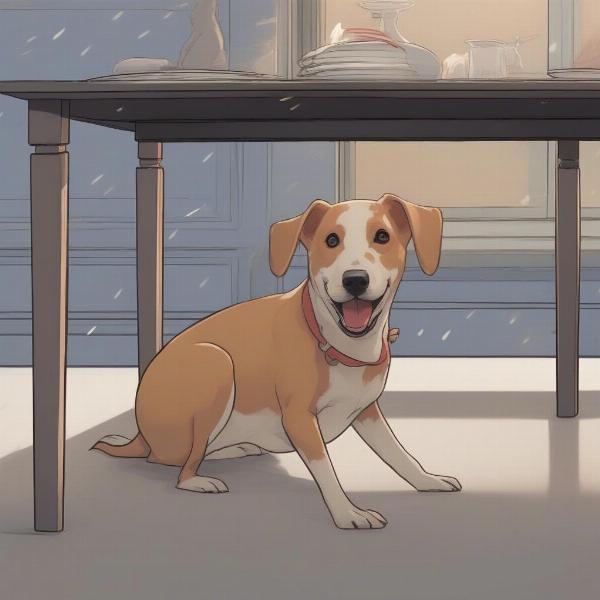Excessive panting in dogs at night can be alarming for any owner. While some panting is normal, especially after exercise or in hot weather, persistent and heavy panting at night warrants closer attention. It can signal anything from discomfort to a serious medical condition. Understanding the potential causes and knowing when to seek veterinary help is crucial for ensuring your dog’s well-being.
Why is My Dog Panting Excessively at Night?
There are several reasons why your dog might be panting heavily at night. It’s essential to consider the context and look for other accompanying symptoms. Is your dog pacing restlessly? Are they showing signs of pain? These details can help you and your vet pinpoint the cause.
Pain or Discomfort
Pain is a common culprit behind excessive panting. Arthritis, injuries, or even gastrointestinal upset can make your dog uncomfortable, leading to increased panting. If your dog seems stiff, avoids movement, or whimpers, pain could be the underlying issue.
Anxiety or Stress
Just like humans, dogs experience anxiety and stress. Loud noises, changes in routine, or separation anxiety can trigger panting, especially at night when it’s quieter and they’re alone.  Anxious Dog Panting If your dog is panting excessively during thunderstorms or when left alone, anxiety could be the cause.
Anxious Dog Panting If your dog is panting excessively during thunderstorms or when left alone, anxiety could be the cause.
Respiratory Issues
Respiratory problems such as asthma, pneumonia, or even heart disease can cause difficulty breathing, leading to excessive panting. These conditions require prompt veterinary attention.
Heatstroke or Fever
If your dog’s environment is too warm, or if they have a fever, panting is a way for them to regulate their body temperature. Make sure your dog has access to cool water and a well-ventilated area, especially during warmer months.
What to Do if Your Dog is Panting Excessively at Night
First, assess the situation. Is your dog showing other symptoms? If the panting is mild and your dog seems otherwise comfortable, monitor them closely. However, if the panting is severe, accompanied by other symptoms like weakness, vomiting, or pale gums, seek immediate veterinary care.
“Excessive panting, especially combined with other symptoms, is a clear sign that something is wrong,” says Dr. Emily Carter, DVM. “Don’t hesitate to contact your veterinarian. Early intervention can make a significant difference.”
When to See a Vet
If your dog’s panting is persistent, severe, or accompanied by other symptoms, it’s crucial to consult a veterinarian. They can perform a thorough examination and determine the underlying cause.
“It’s always better to err on the side of caution,” adds Dr. Carter. “A quick checkup can rule out serious issues and provide peace of mind.”
Conclusion
Excessive panting in dogs at night can be a sign of various underlying issues, from minor discomfort to serious medical conditions. By carefully observing your dog’s behavior and seeking professional veterinary advice when needed, you can ensure they receive the appropriate care and stay healthy and happy. Don’t dismiss persistent panting; it’s always better to be proactive in your dog’s health.
FAQ
- Is panting normal in dogs? Yes, some panting is normal, especially after exercise or in hot weather. However, excessive or persistent panting, especially at night, can be a sign of a problem.
- What are the signs of heatstroke in dogs? Signs of heatstroke include excessive panting, drooling, weakness, vomiting, and collapse.
- Can anxiety cause panting in dogs? Yes, anxiety and stress are common triggers for panting in dogs.
- When should I take my panting dog to the vet? If your dog’s panting is severe, persistent, or accompanied by other symptoms, seek immediate veterinary care.
- How can I help my dog if they are panting excessively? Ensure they have access to cool water and a well-ventilated area. If the panting continues, consult a veterinarian.
- Can pain cause panting in dogs? Yes, pain and discomfort can lead to increased panting in dogs.
- What are some common respiratory problems in dogs? Common respiratory issues in dogs include asthma, pneumonia, and heart disease.
You may also be interested in these related articles on our site: butcher bones for dogs, potato dog toy, dog crate pads.
ILM Dog is your trusted resource for all things canine. We offer expert advice on dog breeds, health, training, nutrition, grooming, and much more. Whether you’re a new dog owner or a seasoned pro, our comprehensive guides and articles provide practical tips and valuable insights to help you care for your furry friend. We are dedicated to promoting responsible dog ownership and providing the best possible care for your canine companion. For personalized advice or to learn more about our services, contact us via email at [email protected] or by phone at +44 20-3965-8624. Visit ILM Dog today for all your dog care needs! dog balls for small dogs You might also like our guide on lab dog gifts.